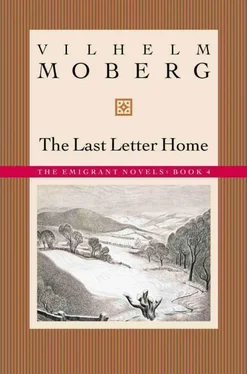Cartilage had grown between the vertebrae, said the doctors in St. Paul and Stillwater. He had once received a blow across his back from the oak he was felling, and in that place the gristle lumps had grown. None of the doctors’ many salves, plasters, and liniments had been able to drive out the pain. He had tried all the remedies known, even those of the old country — lying on cat skins and dog skins, rubbing himself with sheep fat and pork bile, or concoctions of flowers and herbs, moss and ferns. Anything neighbors and friends suggested he would try, but nothing really helped. The auger remained in his back and kept on turning, and would keep on turning as long as he lived.
His backache was the final reward for his labor, for the farmer’s toil. He drew his pay daily in his old age, the sure reward for the oldster.
Charles O. Nelson moved a little in his bed, made his back more comfortable, turned and twisted a little to escape the auger. It hurt most in the afternoons, by evening it eased a little, and then he would walk about over the farm. This was an old habit, to inspect the Nelson Settlement before he retired for the night. At day’s end the old farmer walked to the houses that had been his, saw to it that every door was closed, everything put inside that might suffer from a change in the weather, that the animals were well, that all things — living and dead — were in good keeping. This was a farmer’s daily chore, and he had performed it through the years. Now, as he walked about and saw that all was well, he felt he was still the master of the Nelson Settlement.
The evening inspection would take quite a while for old Charles O. Nelson. His limp made him move slowly, he had to lean on his stick each time he moved his left foot. He took one long step with the healthy leg and two short with the injured one. He walked with bent back, he limped; shuffling along he found his way. It was a great effort for him and when he returned to his room he was completely exhausted. But it was his best hour of the day.
Today he was waiting for that hour, and he had an occupation that helped speed the time. He sat up in bed and pulled out a drawer in the table beside him. He picked up a large folded paper and began to unfold it, slowly, methodically, as if in so doing he would cheat the pain.
It was a map of Ljuder parish. It was his home district that was spread before him here on the blanket. Charles O. Nelson always had the map handy, was always eager to look at the thick, heavy paper with a miniature of his home village. Many years ago he had acquired this map from his son-in-law, Mr. C. A. Persson, “in exchange for his daughter” as he called it. He had lost his oldest daughter but he had received instead a map of his home village.
The map of Ljuder during the years had become worn from frequent handling by the old emigrant. It was made of good paper, but he had fingered it so often and turned and opened it, that it was wrinkled and barely held together at the creases. That was why he handled it so carefully.
Here before him he had his whole home parish with well-marked borders, from Lake Laen in the north to Lake Loften in the south. Across this paper his index finger found the markings, followed the roads he once had walked, stopped at places he knew well, familiar names of farms and cottages. Here was the crossroads where he had danced in his youth, the grove where they had celebrated sunrise picnics, wastelands where he had hunted, lakes, rivers, and brooks where he had fished. He followed lines and curves, he stopped at squares and triangles. There was so much to look for, so much to find. And at each place where his finger stopped his memories awakened: This was his childhood and youth.
How many times hadn’t his fingers wandered over this map. But he was never through with it. Each day he started his search anew. When he had found everything he was looking for, he began all over again. He had been thumbing and reading the map of Ljuder day in, day out, at night with the help of his oil lamp, when the ache assailed him, when sleep fled his bed, weekdays and holidays, summer and winter, year after year, until the thick paper was worn thin from all the thumbing and was ready to fall apart.
The map of Ljuder, spread over the blanket before him, had the shape of a heart. Somewhere near the center of that heart lay a farm where the old emigrant had taken his first steps on earth.
The old man in the bed was shut out from the present and had nothing to expect from the future. To him remained only the past. Again he found the paths of his childhood. Charles O. Nelson, Swedish-born farmer in Minnesota, was old, lame, and stooped, and moved with difficulty over the ground of his new homeland. But here in his bed he walked freely and unencumbered over the roads of his native village.
MAP
of
Ljuder Parish, executed 1847–49
by
Frans Adolf Lönegren, Official Surveyor
The map was well drawn and colors had been freely used. Lakes, brooks, fields, meadows, hills, groves, moors, bogs — each had its own color. The lakes’ surfaces glittered blue, like large ink spots, while smaller ponds and pools were only specks. Rivers and brooks showed their blue veins across the white skin of the paper. Meadows blossomed in green like fresh spring grass, and tilled fields were as yellow as buttercups in bloom. Hills and wastelands lay black, almost like dirty thumbprints. The pine forest was indicated by narrow black lines, like pine needles, and the deciduous forest with light rings, resembling the crowns of lush trees. In the meadows the surveyor had placed men with scythes, and in the wastelands horses, oxen, cows, and sheep grazed. Moors and bogs were gray stripes across the paper, almost like a splash of mud. Everything was there, everything was recognizable to the old one in the bed.
It was a well-illustrated map — he almost smelled the ripe crops, the pungent pine pitch, the sweet birch leaves, fresh milk, sheep wool, bog myrtle, meadow flowers.
The fat, red line across the map was the county road through the parish; village roads were marked in smaller lines of the same color, even paths, disappearing in the wastelands. The borders of farms were marked in red, each place was there, even the bridges, the cornerstones, the rights-of-way. Everything had its proper name in the right place, and the old emigrant found and recognized everything; he was again Karl Oskar of Korpamoen, strolling over his native ground.
The timber road through the pine forest, used only in winter, led all the way to Lake Loften. When the birches were just in leaf he had run barefoot on that road to fish in the lake, where the carp played in schools in the shallow bays, their yellow scales glittering in the sun as he pulled them out. From an alder bush he had cut a fork on which he hung the fish through the gills, and he could feel them dangling on his back as he carried them home, proud and whistling. Dried strips of bark in the ruts, from the winter timbering, scratched against his bare feet; some ruts were still moist and cool, sending shivers up his back. But he carried the glittering burden of carp, he was on the right road for a boy in spring; he was walking the barefoot path, the softest, the easiest path in the world.
He took a side road through the dark forest and came to a pool, all in shadow under the tall pines. The pool water was black-brown, the surface motionless. The ground swayed under his feet as he walked along the muddy edge. If you sank down here you would never get up again! He jumped in — the pool was bottomless. He would feel cold and shiver for hours after a swim in the ice-cold water. In that pool he had baited his hook for eel with white worms from the dunghill, and the fat, greenish eels he had pulled out were so old they almost had moss on them. Once he had caught a pike, and he had had to kill it with a stone it was so big — eight pounds it weighed, at least. So well did he remember the pool that he almost felt the chill vapor that always hung over it.
Читать дальше












